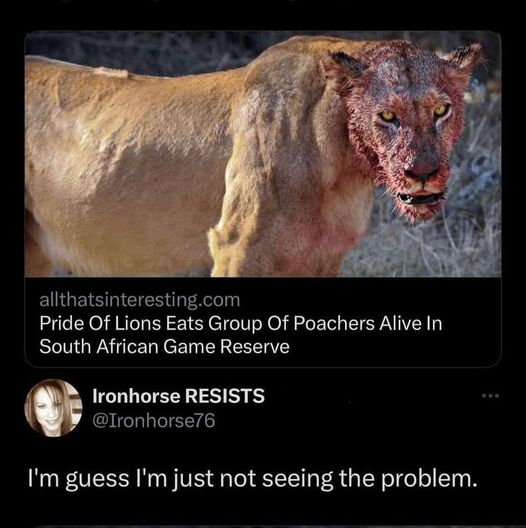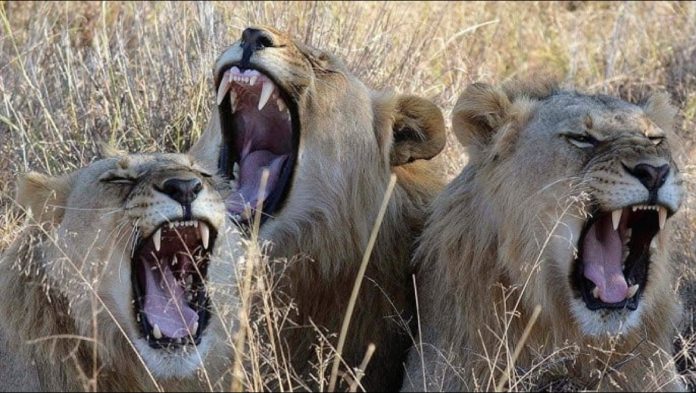The story of a pride of lions killing and eating a group of poachers in a South African game reserve captured the public imagination and, in many ways, has become one of the most satisfying examples of nature’s own justice. This event, which took place in 2018 at the Sibuya Game Reserve in South Africa, is often hailed as the best feel-good story of the last decade. It is a tale that highlights a broader theme: those who engage in killing animals for sport, poaching, or greed ultimately face the consequences of their actions. In this case, it was a swift and brutal end, served by some of the very animals they sought to kill.
Poaching, especially in Africa, is a well-documented crisis that has wreaked havoc on wildlife populations. The illegal hunting of endangered species, often for valuable body parts like rhino horns or elephant tusks, fuels a global black market. It’s an activity driven by greed and carelessness, with no regard for the sanctity of life or the delicate balance of ecosystems. In recent years, conservationists and animal lovers worldwide have grown increasingly disheartened by the sheer cruelty and callousness displayed by poachers. So, when a pride of lions killed and ate a group of these criminals, many people saw it as an act of poetic justice.
The incident occurred in early July 2018 at the Sibuya Game Reserve, located in the Eastern Cape of South Africa. The game reserve is home to the “Big Five”—lion, leopard, elephant, rhino, and buffalo—making it a target for poachers hoping to cash in on illegal wildlife products. It’s believed that the group of poachers entered the reserve under the cover of darkness, armed with high-powered rifles and axes, likely aiming to kill rhinos for their horns, which are highly prized in the illegal wildlife trade.
However, instead of success, the poachers met their end when they crossed paths with a pride of lions. It is reported that the lions ambushed the poachers, killing them before they had a chance to defend themselves. Nick Fox, the owner of Sibuya Game Reserve, said at the time, “The only body part we found was one skull and one bit of pelvis, everything else was completely gone.” This grim image added to the sense of nature’s own brutal form of justice being served.
While the exact number of poachers who met their fate that day remains unclear, some reports suggest three, the fact remains that they were outmatched by nature. As Fox put it, “We suspect two or three men were eaten by the lions, but it’s thick bush out there and there could be more bodies lying somewhere.” What became clear was that the lions had claimed their territory, and the intruders had paid the price for their trespass.
The public’s reaction to this incident has been overwhelmingly positive. Social media platforms lit up with praise for the lions and the idea that karma had dealt with these men appropriately. One Twitter user commented, “The lions did what governments can’t, protect their own without a second thought.” The sentiment was echoed across various platforms, with many pointing out the irony of hunters becoming the hunted. This reversal of roles played directly into the natural sense of justice that many people feel when confronted with stories of senseless cruelty toward animals.

The history of poaching in Africa is a long and devastating one. According to the World Wildlife Fund (WWF), nearly 35,000 elephants are killed each year in Africa, largely for their ivory. Rhino poaching, while less frequent, is equally devastating, with the species driven to the brink of extinction. In South Africa, home to 80% of the world’s rhino population, more than 1,000 rhinos were poached annually between 2013 and 2017. These statistics paint a grim picture, one in which human greed is stripping the continent of its natural heritage.
Yet the poachers in this story did not expect to become a cautionary tale themselves. Their motivation, like many others, was likely financial, driven by the high prices that rhino horn and other animal parts can fetch on the black market. A kilogram of rhino horn, for instance, can sell for as much as $60,000, often making it more valuable than gold or cocaine. It’s this immense profit that drives poachers to risk their lives, breaking laws and infiltrating game reserves in hopes of a big payday. But as this story shows, sometimes the risks far outweigh the rewards.
For many conservationists, the outcome of this incident was a moment of relief in a world where, more often than not, poachers are the ones who win. The lions, in defending their territory, had not only survived but had turned the tables on the men who sought to destroy them. As the reserve owner, Nick Fox, noted, “Poaching is a huge problem in this area, and to have this group of men killed by lions seems like nature’s way of balancing the books.”
The idea of karma, what goes around comes around, resonates deeply in this narrative. There’s a long-standing belief that those who engage in malicious, destructive acts will eventually face the consequences of their behaviour, even if not immediately. The incident at Sibuya is an example of this concept in action. The poachers came to take life, and in the end, they lost their own. It’s a stark reminder that nature is not to be trifled with and that the predators we often fear and demonise are, in fact, playing a crucial role in maintaining the balance of ecosystems.
It’s important to remember that this incident, while extraordinary, doesn’t solve the broader issue of poaching. African wildlife continues to be under threat from poachers, and anti-poaching efforts remain an uphill battle. Organisations like WWF and Save the Rhino International continue to work tirelessly to protect endangered species, lobbying governments, funding anti-poaching patrols, and raising awareness about the impact of illegal hunting. In some cases, communities are being involved in conservation efforts, as it has been recognised that empowering locals to protect their own natural resources can be an effective strategy in the fight against poaching.
However, incidents like the one at Sibuya also bring to light a growing frustration with traditional anti-poaching methods. Many game reserves, despite being patrolled by armed rangers and using advanced technology like drones and thermal imaging, are still falling prey to poachers. The black market for illegal animal products continues to thrive, fuelled by demand from countries like China and Vietnam, where rhino horn is erroneously believed to have medicinal properties. This demand has made the fight against poaching one of the most significant challenges facing African wildlife conservation today.
In the face of such an overwhelming crisis, it’s understandable that the public reaction to the Sibuya incident was so celebratory. It was a rare instance where the natural world seemed to take back control, and where justice, though brutal, was served without human intervention. For many, it was a moment of triumph in an otherwise bleak narrative of loss and destruction.
While some might argue that death, in any form, should not be celebrated, the case of these poachers offers a powerful reminder of the stakes involved in wildlife conservation. The death of these men serves as a deterrent, a warning to others who might consider engaging in the same illegal and immoral activities. In the end, the lions not only protected themselves but also sent a clear message to the wider world: nature will defend itself, and sometimes, that defence is deadly.
In discussing the concept of karma in relation to this story, it’s worth considering the broader philosophical implications. Karma, in its simplest form, is the idea that actions have consequences; good or bad, they will eventually return to the individual who performed them. This concept, found in many spiritual traditions, seems to have played out perfectly in the case of the Sibuya poachers. They sought to destroy life for profit, and in turn, their own lives were taken.
The lions, acting purely on instinct, became agents of this karmic justice. Unlike humans, they weren’t motivated by malice or greed; they were simply defending their territory. This lack of human intent makes the story even more satisfying for many, as it shows that justice can come in unexpected and unbiased ways. The poachers weren’t killed out of vengeance; they were killed because they made the mistake of underestimating the power of nature.
The story of the Sibuya lions has since become an emblem of the ongoing fight against poaching and a reminder of the dangers that come with exploiting the natural world. For those who love animals and work to protect them, it is a rare moment of victory in a long and often discouraging battle. As conservationist and wildlife advocate Damian Aspinall said, “Poachers are the lowest of the low. The world would be a better place without them. If you make a living out of killing innocent creatures, you deserve to face the consequences.”
In the years since the incident, poaching continues to be a problem in South Africa and across the African continent. However, the story of the Sibuya lions stands as a reminder that there is still hope, and that nature has its own way of fighting back. The incident was a moment of balance being restored, however fleeting it may have been, and it has since become a powerful symbol of the need for continued efforts to protect wildlife from those who seek to exploit it.
The idea that anyone who kills animals for sport or profit deserves nothing but bad karma is one that resonates strongly with animal lovers and conservationists around the world. As the Sibuya story shows, sometimes that karma arrives swiftly and decisively. And when it does, it’s hard not to feel a sense of satisfaction, knowing that justice—however it is delivered—has been served.
KEEP US ALIVE and join us in helping to bring reality and decency back by SUBSCRIBING to our Youtube channel: https://www.youtube.com/channel/UCQ1Ll1ylCg8U19AhNl-NoTg AND SUPPORTING US where you can: Award Winning Independent Citizen Media Needs Your Help. PLEASE SUPPORT US FOR JUST £2 A MONTH https://dorseteye.com/donate/







